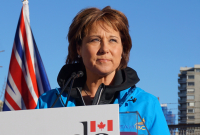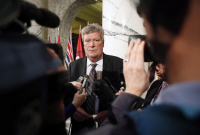Support strong Canadian climate journalism for 2025
The official start to British Columbia's election campaign is set to launch Tuesday, but the buses are already rolling and the attack ads and name-calling are shifting into high gear.
While Premier Christy Clark is expected to visit Government House to start the 29-day campaign, the parties have been in election mode since mid-March when the legislature adjourned, allowing politicians to return to their ridings.
Clark's Liberals are looking to win a fifth consecutive mandate, while the New Democrats are promising a toe-to-toe battle to convince voters to give them a shot at government after 16 years in opposition.
The Greens, who hold one seat in the legislature, are mounting a full slate of candidates and are boldly predicting a political breakthrough that shakes up B.C.'s two-party tradition.
The Liberals enter the campaign with a strong economic record, which includes the lowest jobless rate in Canada, a top-performing economy and consecutive surplus budgets.
The party also has a hefty bank account to use during the campaign. Recent figures released by ElectionsBC show the party raked in more than $13.1 million in political donations last year. The New Democrats took in less that half that total at $6.2 million.
Both parties have been dogged by controversy over political donations, something that is expected to be an election issue.
A special prosecutor was appointed days before the start of the campaign to help the RCMP in its investigation of possible Election Act violations over political donations to both major parties.
The Liberal government is also dragging baggage over sky-high housing costs, the long-running feud over funding public education, and unfulfilled liquefied natural gas promises.
Clark campaigned in 2013 on promises of a debt-free B.C. fuelled by the job-creating LNG industry. She said she believes the dream of LNG export plants is still alive even though markets have cooled development.
She reacted sternly to NDP comments that LNG development has been a B.C. Liberal failure.
"They should be really happy if it's a failure because they've tried every step of the way to shut the whole process down, to kill LNG before it even got going," said Clark in a recent interview. "They just want to quit. It will happen. We've got to be determined about it. You don't get points for quitting."
NDP Leader John Horgan said the party will not be as friendly as in the 2013 campaign where it focused on issues and lost after holding a 20-point lead in public opinion polls.
"I do believe we need to be more positive about our politics, but that doesn't mean you allow your opponents a free pass," he said. "It means you should talk more boldly about the things you want to do."
Horgan said he has just one job leading this campaign.
"For me, I have to convince as many people as possible to support change in B.C.," said Horgan. "That's my task."
The NDP unveiled its bus last Tuesday and Horgan has already visited B.C.'s Interior and much of Metro Vancouver.
The New Democrats recently launched TV ads attacking the Liberals on housing and rising fees and rates that increase costs for families. Its ads also remind viewers about the RCMP investigation into political contributions in B.C.
Its message: "Christy Clark's BC Liberals. They're not working for you."
The Liberals have countered with an ad that depicts Horgan as a weather vane, whose positions on major issues, including the Trans Mountain pipeline expansion project, shift with the direction of the wind.
"Same weak leadership. Same old NDP," the TV ad concludes.
Green party leader Andrew Weaver, a noted climate scientist, said he will present the Greens as a principled, fiscally sound alternative to the Liberals and NDP.
"We see too much politics being based on sound bites and too little being based on thoughtful analysis," he said.
The current standings in the legislature are: 47 Liberals, 35 New Democrats and three Independents — which including two new seats created this election brings the total number to 87.
— With files from Geordon Omand and Laura Kane.






Comments